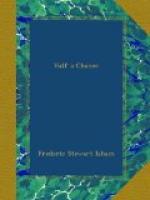John Steele was rather late in arriving at the house of Sir Charles Wray in Piccadilly the following Thursday. But nearly every one else was late, and, perhaps knowing the fashionable foible, he had purposely held back to avoid making himself conspicuous by being prompt. The house, his destination, was not unlike other dwellings on that historic thoroughfare; externally it was as monotonous as the average London mansion. The architect had disdained any attempt at ornamentation. As if fearful of being accused of emulating his brother-in-art across the channel, he had put up four walls and laid on a roof; he had given the front wall a slightly outward curve. In so doing, he did not reason why; he was merely following precedent that had created this incomprehensible convexity.
But within, the mansion made a dignified and at the same time a pleasant impression. John Steele, seated at the rear of a spacious room, where he a few moments later found himself among a numerous company, looked around on the old solid furnishings, the heavy rich curtains and those other substantial appurtenances to a fine and stately town house. That funereal atmosphere common to many homes of an ancient period was, however, lacking. The observer felt as if some recent hand, the hand of youth, had been busy hereabouts indulging in light touches that relieved and gladdened the big room. Hues, soft and delicate, met the eye here and there; rugs of fine pattern favored the glance, while tapestries of French workmanship bade it wander amid scenes suggestive of Arcadia. Many found these innovations to their liking; others frowned upon them; but everybody flocked to the house.
The program on the present occasion included a poet and a woman novelist. The former, a Preraphaelite, led his hearers through dim mazes, Hyrcanian wilds. The novelist on the other hand was direct; in following her there seemed no danger of losing the way. At the conclusion of the program proper, an admirer of the poet asked if their young hostess would not play a certain musical something, the theme of one of the bard’s effusions, and at once Jocelyn Wray complied. Lord Ronsdale stood sedulously near, turning the leaves; Steele watched the deft hand; it was slim, aristocratic and suggested possibilities in legerdemain.
“An attractive-looking pair!” whispered a woman near John Steele to another of her sex, during a louder passage in the number. “Are they—”
“I don’t know; my dear. Perhaps. She’s extremely well-off in this world’s goods, and he has large properties, but—a diminishing income.” She lowered her voice rather abruptly as the cadence came to a pause. The music went on again to its appointed and spirited climax.
“Was formerly in the diplomatic service, I believe;”—the voice also went on—“has strong political aspirations, and, with a wealthy and clever wife—”
“A girl might do worse. He is both cold and capable—an ideal combination for a political career—might become prime minister—with the prestige of his family and hers to—”




